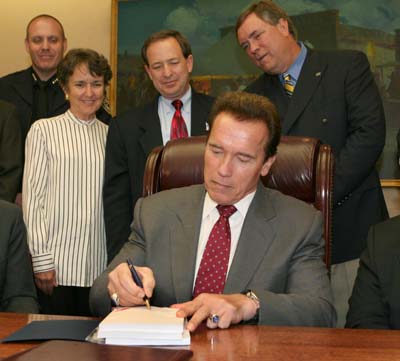
Gov. Arnold Schwarzenegger signed the most overdue state budget
in California history Tuesday, skipping the usual fanfare because
he said the Legislature’s efforts on the $144.5 billion spending
plan were nothing to celebrate.
SACRAMENTO
Gov. Arnold Schwarzenegger signed the most overdue state budget in California history Tuesday, skipping the usual fanfare because he said the Legislature’s efforts on the $144.5 billion spending plan were nothing to celebrate.
Nearly a quarter of the way through its fiscal year, the state finally has freed up billions of dollars to pay medical clinics, nursing homes, daycare centers and contract vendors. The 85-day impasse stemmed from a partisan legislative standoff over how to close California’s $15.2 billion deficit.
The governor signed the budget bills in his office, rather than the Capitol rotunda where budgets are usually signed.
“Why I didn’t feel like celebrating in the rotunda is that it is inexcusable to have a budget that’s three months late,” Schwarzenegger said after signing the budget before a small gathering of local officials. “It’s three months late because both of the parties stayed in their ideological corners and refused to come out.”
Legislative Republicans opposed any tax increase, while Democrats sought to combine budget cuts with higher taxes on corporations and the wealthiest Californians.
Schwarzenegger had offered what he considered a compromise proposal involving a temporary 1 cent increase in the state sales tax that would drop after three years. That plan failed to gain support from Republicans, which meant it would not be able to generate the required two-thirds vote in the Assembly or Senate.
The final version approved by the Legislature last week includes $7.1 billion in spending cuts, which advocates say will trigger deep cuts to health care programs. Critics also said the plan relies on accounting tricks to inflate revenue and makes permanent some tax breaks that will lead to larger deficits.
Schwarzenegger trimmed another $510 million through line-item vetoes Tuesday, but a leading Democratic legislator said that in doing so he effectively raised taxes for senior citizens by cutting tax credits geared toward them.
“That seemed unconscionable to me,” said Assemblyman John Laird, who chaired the Assembly Budget Committee. He called the governor’s line-item vetoes a “disaster” for eliminating the tax credits and for cutting certain methamphetamine and HIV prevention programs.
Lawmakers met the governor’s demands for a stronger rainy day fund and authority to make spending cuts during the year, but they did not address the imbalance between revenue and spending.
And the budget battle isn’t quite over. The changes to the rainy day fund require voter approval, as does a plan to borrow $10 billion from future lottery revenue to help stabilize the next two state budgets. Schwarzenegger said a special election is likely to be scheduled for June.
Democratic Assembly Speaker Karen Bass reiterated her call to have a commission review the state’s tax structure, while Republican leaders pledged to fend off tax increases in the next fiscal year that will start July 1.
Those negotiations are expected to be just as frustrating as this year’s, as the state’s economy continues its tailspin. Lower tax revenue and automatic spending increases are expected to produce a deficit of at least $1 billion in the 2009-10 fiscal year.
The governor’s finance director, Michael Genest, said revenues were based on the belief that the state’s economic troubles would bottom out by the end of the fiscal year and begin to recover next year.
Next year’s shortfall will grow significantly if voters reject the lottery proposal, which is expected to add $5 billion annually for the next two years.
After signing the budget, Schwarzenegger took part in a rally for Proposition 11, the Nov. 4 ballot initiative that would take authority to draw legislative districts away from state lawmakers and give it to an independent citizen’s commission overseen by the state auditor.
Schwarzenegger says the current system creates a conflict of interest that prevents truly competitive races for Assembly and Senate seats. When districts are weighted strongly for Democrats or Republicans, only the most partisan candidates win and head to Sacramento. That dynamic makes compromise extremely difficult, Schwarzenegger has said, pointing to this year’s protracted budget deadlock as an example.









